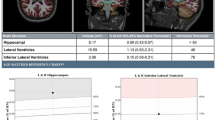Abstract
Background
Verbal memory is an essential cognitive ability with scope for adequate treatment of information and for orientation in everyday life. Our study is centered on memory performance in the wake of treatment for ruptured intracranial aneurysm.
Methods
Three psychological tests were performed: (1) within a month of the neurosurgical intervention, (2) 1 year and (3) 5-7 years after the ruptured aneurysm treatment. Under comparison are the overall results of tests for verbal memory capacity in a cohort of patients (N = 59) and in the control group.
Results
Three post-treatment measurements revealed a persistent deficit of verbal memory. The cohort’s average performance improved from -1.3 SD (standard deviation) below the average of the norm to -0.5 SD below the norm at the second test 1 year after treatment, while at the third test the deficit had worsened to -0.68 SD. Similarly, testing for long-term recovery at 5-7 years postoperatively showed the patients’ performances to be 2/3 SD below the average of the general population.
Conclusions
The results of the study imply the need for long-term rehabilitation of memory in this particular group of patients.

Similar content being viewed by others
References
D’Esposito MD, Alexander MP, Fischer R, Mcglinchey-Berroth R, O’Connor M (1996) Recovery of memory and executive function following anterior communicating artery aneurysm rupture. J Int Neuropsychol Soc 2:565–570
Haug T, Sorteberg A, Sorteberg W, Lindegaard KF, Lundar T, Finset A (2007) Cognitive outcome after aneurysmal subarachnoid hemorrhage: time course of recovery and relationship to clinical, radiological, and management parameters. Neurosurgery 60(4):649–656
Hellawell D, Taylor R, Pentland B (1999) Persisting symptoms and carers’ views of outcome after subarachnoid haemorrhage. Clin Rehabil 13:333–340
Keith JR, Punte AE (2002) Deficiences in the detection of cognitive deficits. Neuropsychol 16:434–439
Larsson C, Rönnberg J, Forssell A, Nilsson LG, Lindberg M, Angquist KA (1989) Verbal memory function after subarachnoid haemorrhage determined by the localisation of the ruptured aneurysm. Br J Neurosurg 3(5):549–560
Lezak MD, Howieson DB, Loring DW (2004) Neuropsychological Assessment, 4th edn. Oxford University Press, New York
Mitrushina MN, Boone KB, Razani J, D’Elia LF (1999) Handbook of normative data for neuropsychological assessment. New York, Oxford University Press
Ogden JA, Utley T, Mee EW (1997) Neurological and psychosocial outcome 4 to 7 years after subarachnoid hemorrhage. Neurosurgery 41(1):25–34
Ørbo M, Waterloo K, Egge A, Isaksen J, Ingebrigtsen T, Romner B (2008) Predictors for cognitive impairment one year after surgery for aneurysmal subarachnoid hemorrhage. J Neurol 255:1770–1776
Preiss M (1999) Paměťový test učení (in Czech = Auditory verbal learning test). Psychodiagnostika, 1999
Preiss M, Koblihová J, Netuka D, Klose J, Charvát F, Beneš V, Bernardová J (2007) Cognitive deficit after treatment for intracranial aneurysms—results of verbal memory testing at one month and at one year after neurosurgery. CSNN 103:37–42
Preiss M, Koblihová J, Netuka D, Klose J, Charvát F, Beneš V (2007) Cerebral ruptured aneurysm patients treated by clipping or coiling: comparison of long-term neuropsychological and personality outcome. Zentralbl Neuroch 68:169–175
Preiss M, Lukavský J, Steinova D (2010) Decreased self-reported cognitive failures after memory training in a large group. Educ Gerontol 36(9):798–808
Ravnik J, Starovasnik B, Šešok S, Pirtošek Z, Švigelj V, Bunc G, Bošnjak R (2006) Long-term cognitive deficits in patients with good outcomes after aneurysmal subarachnoid hemorrhage from anterior communicating artery. Croat Med J 47:253–263
Rey A. L’examen clinique en psychologie. Paris: Preses Universitaires de France, 1964
Acknowledgements
We greatly appreciate the support by grants IGA 9640-4 and MZCR MZ0PCP2005
Conflicts of interest
None.
Author information
Authors and Affiliations
Corresponding author
Rights and permissions
About this article
Cite this article
Preiss, M., Koblihová, J., Netuka, D. et al. Verbal memory capacity after treatment for ruptured intracranial aneurysm—the outcomes of three psychological tests: within a month, 1 year after and 5-7 years after treatment. Acta Neurochir 154, 417–422 (2012). https://doi.org/10.1007/s00701-011-1256-2
Received:
Accepted:
Published:
Issue Date:
DOI: https://doi.org/10.1007/s00701-011-1256-2




